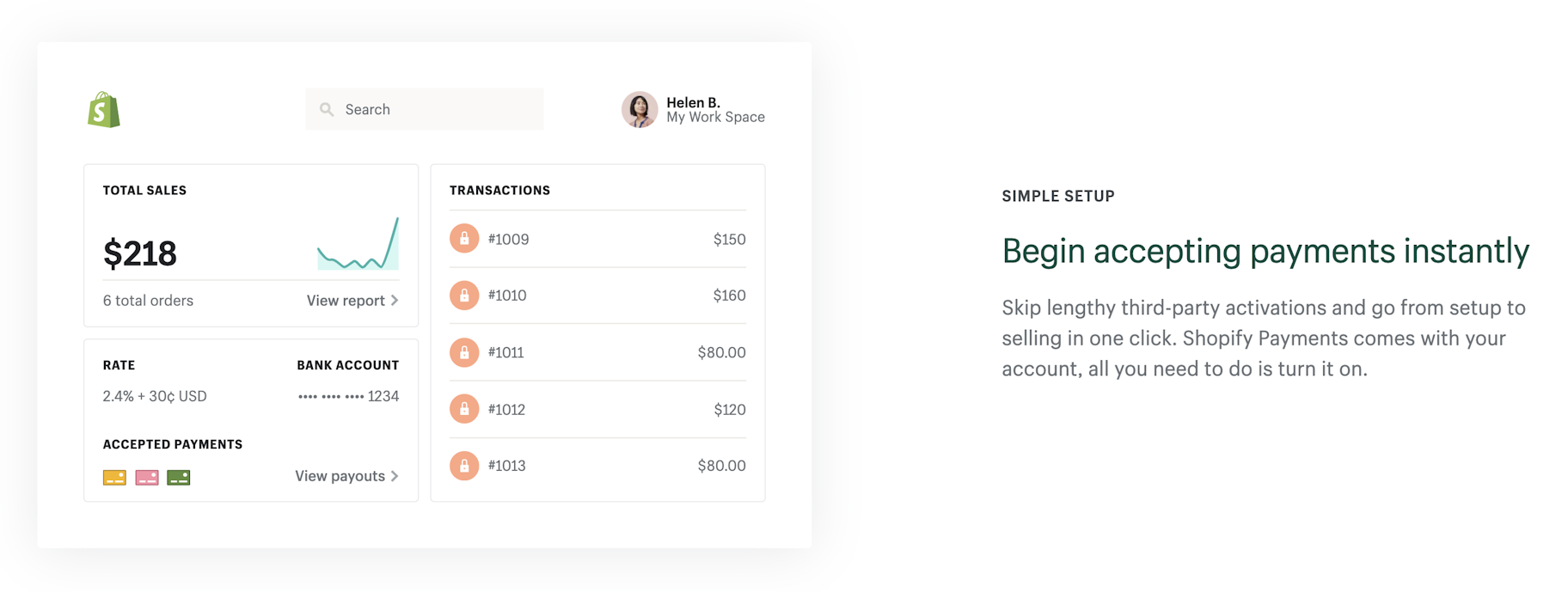Starting an online business isn't easy. There are so many important decisions to make. What should you sell? Who should you sell to? How will you get customers?
If that's not enough, every other week there seems to be a new business trend online. There's chatbots, cryptocurrencies, Facebook ads, Instagram influencers, and many more. What should you pay attention to? What actually matters?
If you want to know how to start an online business in 2021, we've got you covered. In this quick and simple article, we'll take you through how to start a small business online, step-by-step. Consider this as a starting an online business for dummies guide, as we cover everything in plain English and list simple, actionable instructions to help you start.
How to Start a Business Online (From Scratch)
Thinking of starting a Shopify Store?
Bring your business online with Shopify, the most powerful ecommerce platform out there
Start a free Trial today#1: Don't Start Building Yet
When looking to set up a company online, it can be tempting to jump into action.
So, if you're feeling the urge to build a website, choose a business name, or create a logo, hold off for now.
If you want to start a successful online business, first, you need a strategy. And steps two, three and four of this article will show you how to create your online business strategy.
#2: Choose a Business Model
When learning how to build an online business from scratch, it helps to know about some tried-and-tested online business models.
Here are six types of online businesses to consider:
- Affiliate Marketing: Promote other business's products and services online, and receive a commission for each sale you make with this passive income idea.
- Freelancing: Provide a service to other individuals and businesses using a skill that you have, such as advertising, writing, designing, or programming.
- Coaching and Consulting: Become a coach or a consultant and sell your expertise, advice, and guidance.
- Information Products: Package and sell your expertise in ebooks, worksheets, templates, and online courses.
- Software as a Service (SaaS): Create a piece of software or application, and charge users a recurring subscription fee.
- Ecommerce: Use a service like Shopify to set up a website and sell physical products online.
Want more online business ideas to help inspire you? Check out our guide, "25 Small Business Ideas to Make Money in 2021".
#3: Identify Your Target Market
Next, you need to get clear on your target market. In other words, who are you going to serve?
This step is absolutely vital.
As the marketer Philip Kotler once said, "There is only one winning strategy. It is to carefully define the target market and direct a superior offering to that target market."
Here's the trick: Make sure you are part of your target audience.
Think about it. If you've been camping your entire life, you'll understand the problems, desires, and language of other campers. As a result, it'd be much easier to sell camping products online.
Plus, your marketing will be more successful because you'll have a better understanding of how to communicate with other campers.
On the other hand, if you've never been camping in your life, you'd probably struggle – a lot – to sell camping products online.

So, when choosing a target audience, ask yourself:
- What are my hobbies and interests?
- Is there anything that I know a lot about?
- What do I spend most of my time thinking, talking, and reading about?
#4: Find a Problem to Solve
When learning how to start an online business, it's important to note one key thing: all businesses solve a problem.
Plumbers fix leaking pipes. Hollywood movies fulfill people's boredom, curiosity, interest, and the need to escape and relax. Clothing brands help people express themselves and feel attractive.
Here's the golden rule: The bigger the problem you can solve – and the better you solve it – the more money people are willing to pay.
For example, take healthcare services. They solve a big problem, which is why almost everyone is willing to spend a lot of money on it.
On the other hand, not many people will pay you to stop their table from wobbling. It's not a big problem, and they don't need help solving it.
Bottom line: If you want to identify how to start an online business, you need to find a good problem to solve.
Here are three examples:
- Target market: Fashion-conscious teenage boys
- Problem: The fashion-conscious want to stand out from the crowd without spending too much money.
- Solution: Create a clothing line that's flamboyant and budget-friendly.

- Target market: Marketing managers at multinational software companies.
- Problem: Businesses need to drive traffic to their websites.
- Solution: Write articles that rank on the first page of Google to drive traffic.
- Target market: Working Moms with young children.
- Problem: Many moms want to work out regularly, but they don't have much time.
- Solution: Create a time-saving fitness program and schedule.
How can you find a problem to solve?
- Join Facebook groups and online forums and ask people what they need help with.
- Use Google Keyword Planner to find out what people are searching for.
- Find successful online businesses and identify the problem they solve, then look for ways to do it better.
#5: Analyze The Competition
Anyone learning how to open an online business shouldn’t sleep on competitor analysis.
Analyzing your competitors helps you stay on the cutting edge of what’s working in your niche, identify successful tactics and new trends, and anticipate shifts in the market. It also helps define your messaging, positioning, and overall business strategy.
So how do you conduct a competitive analysis? Here are some tips:Subscribe to your competitors’ blog
- Buy a product they sell
- Abandon a product in their shopping cart
- Sign up for their newsletter
- Follow them on social media
While taking these measures, make sure to document your findings with notes on each approach. You want to be able to find relevant insight when you need it.
By analyzing their customer experience and looking at how they engage people via content, you can identify tactics that your competitors are using to drive sales.
Pro Tip: Consider doing a SWOT analysis to accompany the findings from your research. It’s a blueprint that leans into your competitors’ strengths and weaknesses to define areas of improvement. To learn more about this tactic, check out our guide, “Everything You Need to Know About SWOT Analysis.”
#6: Cover Your Legal Bases
Any business you start must be properly aligned with the laws and regulations in your region. So make sure to read up on online business legal requirements when starting a new internet business.
Just some of the legal aspects you’ll need to consider include:
Business structure
Register as an LLC or sole proprietor for online business? You can research and decide on your own, but it pays to get input from a tax specialist.
Licenses and permits
Depending on what type of business you start, you may need a license to operate it. This varies depending on where you live, so contact your local state department to find out more.
Tax obligations
Most online business owners are required to pay income tax. Additionally, you might have sales tax obligations if you sell products to consumers in certain countries. So before starting your business, consider speaking to an attorney to learn about the applicable taxes and the list of online business documents you’ll need to file them.

Copyright, patent, and trademarks
You’ll want to cover these legal elements to avoid trouble down the road. For example, registering your trademark will prevent others from using your brand name, saving you the hassle and cost of rebranding.
#7: Select Your Sourcing Strategy
If you’re interested in starting an online ecommerce business, you’ll need to find reliable and trustworthy sources of inventory.
There are several ways to do this:
- Search for product manufacturers on websites like Alibaba or directories like Kompass, Sourcify, and ThomasNet.
- Find product wholesalers in or around your state on Handshake.
- Discover dropshipping suppliers on platforms like Oberlo.
The last option is highly accessible and gives you a chance to start your business without making a huge upfront investment.
With dropshipping, your product supplier ships and fulfills an order only after a customer has made a purchase; they handle the storage and logistics part of the business while you handle marketing and customer support.
Check out this list of the best dropshipping suppliers to find valuable partners you can count on for order fulfillment.
#8: Set Up Your Payment Methods
You’re almost there! Now is the time to decide how your business will accept payments and how you as business owner will receive payouts.
There are several online payment options available to you. The most popular ones include accepting credit cards, PayPal, Apple Pay, and Google Pay.
If you’re planning to use Shopify to start an ecommerce business, you can activate the provider’s integrated payment solution called Shopify Payments. It sets you up to accept all major payment methods and comes with 0% extra transaction fees.

For a service-based web business like freelance writing, be sure to check out Transferwise, Payoneer, Stripe, and 2Checkout.
Regardless of the payment method, you should be able to set your payout schedule. You can choose to receive your money daily, weekly or monthly — depending on your preferences when it comes to cash.
#9: Build Your Sales Platform
Once you've identified your business idea and covered your legal bases it's time to build your platform.
How?
Well, if you plan to start an ecommerce business, build a website with Shopify and then find products to sell with Oberlo.
If you plan to start freelancing, coaching, or consulting, Shopify has the option of plugging in many popular tools like Digital Downloads to sell digital products online, ReCharge to sell subscriptions online, and SendOwl to sell videos online.
Keep things simple.
At this point, your business is still in the realm of theory. So try not to invest too much money, time, or energy into building a perfect website.
Instead, test your business idea and make sure it works before you invest.
Eric Ries, the author of The Lean Startup, said, "We must learn what customers really want, not what they say they want or what we think they should want."
#10: Choose a Marketing Method
When you’re ready to start promoting your online business, you need to choose a marketing method.
There are many different online marketing methods out there. However, when it comes to learning how to start an online business, some are better than others.
Here are four online marketing methods that you can use to land sales relatively quickly:
- Social Media Marketing: Use social media to create and share content, engage with your target audience, and drive traffic to your website to land sales.
- Direct Outreach: Reach out to individuals at companies to pitch your services.
- Paid Advertising: Advertise on platforms like Facebook, Instagram, Google, and YouTube to increase brand awareness and drive sales.
- Influencer marketing: Team up with influencers to promote your products directly to their existing followings.
Summary: How to Start an Online Business?
Wondering how to start an online business in 2021? Here are 10 steps to starting an online business:
- Create a good business strategy before you start building things.
- Choose an online business model that suits your skills, interests, and preferences.
- Identify your target market – and make sure that you are part of it.
- Identify a problem that your target audience has, and find a way to help solve it.
- Study your competitors to identify opportunities for improvements.
- Fulfill the legal requirements, including getting a business license.
- Choose a sourcing strategy that streamline your order fulfillment.
- Set up your payment gateway and payouts to collect and receive payments.
- Build a basic sales platform to test your business idea.
- Choose a marketing method and start promoting your business.
Finally, it can take a while to learn how to start an online business successfully. So don’t worry if your first online business doesn’t take off immediately. Many of the most successful entrepreneurs failed multiple times before achieving success.
As the co-founder of Apple, Steve Jobs, once said, “I’m convinced that about half of what separates the successful entrepreneurs from the non-successful ones is pure perseverance.”
Bonus: Additional Resources to Help You Build and Start Your Online Business
- How to Build Your Own Brand From Scratch in 7 Steps
- 9 Best Shopify Tools for New Entrepreneurs
- How to Get Free Media Coverage for Your Business
- Decoding Product Life Cycle Stages (And Optimizing For Them)
- 15 Ways to Increase Social Media Engagement Quickly
- What You Need to Know About Pricing Before You Launch
- Ecommerce Shipping Solutions: Guide to Ecommerce Delivery
- Product Page Tune-Up: 9 Timeless Ways to Increase Conversions
- 10 Tips on How to Handle Customer Complaints
- 9 Ways to Earn Customer Trust When You Have Zero Sales




